By Erica and Matt Chua, on Tue Jan 15, 2013 at 9:15 AM ET “India is cheap,” has been stated so many times that it must be true. Have you ever seen evidence though? Before visiting I heard anecdotes that it is cheap, things such as “a hotel costs $1/night” and, “I spent less than $5 per day.” Even though millions visit India annually, I never found any evidence of how cheap it was until I actually visited myself. Continuing on with our careful book keeping, while in India we tracked our daily spending, item-by-item, to understand how much India costs. After four months in India I can definitively say, India isn’t necessarily cheap.

Here are the numbers, broken into cost per day of countries we’ve visited. The bold numbers are the lowest amount for each major travel category. In a couple cases I excluded outliers that I know aren’t apples-to-apples comparisons. For example, the “Accommodations” and “Food” costs of Nepal are skewed because many trekking hotels provide accommodation for free if you purchase your meals there, therefore the actual costs of each category is a blend of the two. Sri Lanka’s “Sightseeing” costs are similarly skewed, therefore excluded from being called the lowest cost. As you can see, while India is the second cheapest country we’ve visited overall, in no individual category is it cheapest.
BEHIND THE NUMBERS
The reality behind the numbers further dispel the myth that India is cheap. The quality of budget travel experiences in India is shockingly low. When paying similar prices to other countries, budget travelers in India receive substantially less quality, comfort and safety for the money. India is correctly referred to as cheap because it is not a good value. Here are some examples of how little money in India gets you even less.

The bathroom of the most expensive place we stayed in India, $20/night in Kolkata. After fighting a brilliant battle the cockroaches won. We ceded the bathroom to them and used the shared bath.
Read the rest of…
Erica and Matt Chua: Is Indian Travel Really Cheap?
By Jonathan Miller, on Mon Jan 14, 2013 at 1:30 PM ET
By Jonathan Miller, on Wed Jan 9, 2013 at 11:15 AM ET
Snow in Jerusalem?
Flooding in Tel Aviv?
 Dogs and Cats Living Together?
Read the rest of…
Were the Mayans Just a Month Early?
By Erica and Matt Chua, on Mon Jan 7, 2013 at 9:15 AM ET
Writes contributing RP John Y. Brown, III:
One of the greatest sins we can commit is to have a chance to get to know extraordinary people. And then not take advantage of it. And you never know when the opportunity will present itself. So always be ready to talk. Even when you’re not sure.
A picture of a cat siting on a column led to some chuckles from my wife and daughter but then a nice lady with a very professional looking camera decided to take the same shot. I nudged my wife and daughter and said, “Told ya it was a good photo to take.”
The woman with the professional camera overheard us and, along with her husband, laughed. And that’s all I needed. Over the next 20 minutes I learned that Matt Chua worked as a VC for 6 years before he and his wife, Erica, dropped out and became professional world travelers 2 years earlier. They’ve visited and written about 30 countries, mostly about economic development but also offering a sort of young person’s Trip Adviser take on each destination. (Think of Albert Brooks’ Lost in America —but working out. And going international)
Next year Matt hopes to find himself in Stanford’s MBA program. And deserves to be there. And if that still isn’t enough to pique your curiosity, their website is titled “LivingIF.com” with the tag line, “Living to never wonder, What if.”
Now, we are pleased to have Matt and Erica Chua join us as weekly travel columnists at The Recovering Politician, with their first column, cross-posted from LivingIF.com, below. Please help me welcome them to the RP Nation, and come back every Monday at this time to read about their next extraordinary adventure!
===

Incomparable. Stunning. Choose your superlative…none will do the Everest Region justice. Nowhere else on earth is like it. Walking amongst the world’s largest mountains, admiring deep valleys and snowcapped peaks, will be one of your life’s highlights.

Here even view from the outhouses are spectacular…
Read the rest of…
Erica and Matt Chua: Hiking Mount Everest and Three Passes Unguided
By Jonathan Miller, on Wed Jan 2, 2013 at 1:30 PM ET I’ve written extensively at this site and The Huffington Post about the liberal, Zionist case for a two-state solution that provides for a Palestinian homeland on most of the West Bank, and a safe and secure Jewish State next door.
Turns out an overwhelming majority of Israelis — 67% in fact — agree with me. From The Times of Israel:
A broad majority of the Israeli public would vote in favor of a peace agreement with the Palestinians, if the government brought a plan that offered security guarantees to a referendum, polls published Sunday by the S. Daniel Abraham Center for Middle East Peace found.
Roughly two-thirds of respondents (67 percent) expressed support for a two-state solution based on the 1967 borders, with land swaps; a demilitarized Palestine; and Jerusalem’s Old City administered jointly by the United States, Israel, and the Palestinians, with Israel maintaining control of the Western Wall.
The S. Daniel Abraham Center for Middle East Peace, a non-profit advocacy group based in Washington DC, approached two Israeli research companies, the Dahaf Institute and Smith Consulting, requesting that they survey Israeli opinions regarding a future peace agreement with the Palestinians. Each poll was conducted independently…
In both polls, respondents were asked how they would vote if the government brought to a referendum a peace agreement that would end the Israeli-Palestinian conflict with the following provisions: Its implementation would take place only after the Palestinians would fulfill all their commitments with an emphasis on fighting terror, and the implementation would be monitored and verified by the United States.
The principles of the hypothetical agreement included:
- Two states: Israel the state of the Jewish people and Palestine the state of the Palestinian people.
- Palestinian refugees will have a right to return only to the new state of Palestine.
- The Palestinian state will be demilitarized, without an army.
- Jewish neighborhoods of Jerusalem will come under Israeli sovereignty and Arab neighborhoods under Palestinian sovereignty.
- The Old City within the walls will be without sovereignty and will be jointly administered by the United States, Israel, and the Palestinians. The Holy Places will be under the same religious supervision as current arrangements (for example, the Western Wall will be under Israeli supervision and responsibility).
- Borders will be based on the 1967 lines and will include land swaps equal in size that will take into consideration Israel’s security needs and will maintain the large settlement blocs under Israeli sovereignty.
According to the Dahaf poll, 67% of respondents would vote in favor of such an agreement, 21% would oppose it and 12% did not answer. The Smith poll found that 68% would support the agreement (of them 40% would strongly support it), 25% would oppose it (17% strongly oppose it) and 7% had no opinion.
Click here for the full article.
By John Y. Brown III, on Fri Dec 21, 2012 at 9:15 AM ET 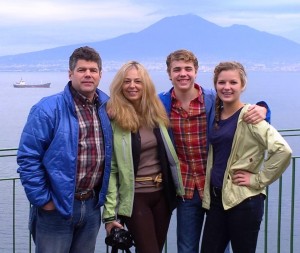 Well, the trip is about over now. The trip of a lifetime, for sure, for my family. Well, the trip is about over now. The trip of a lifetime, for sure, for my family.
We’d never before been on a cruise or to the Mediterranean. And had the great good fortune of doing both. For that I am grateful.
And, as with all family vacations, the best is yet to come. It’s my experience that the memory of the vacation always exceeds the experience of it. Not sure why it works that way, but it does. For us anyway.
We saw a lot and learned a little and may be inspired to learn a lot more as a result of our travels.
It’s a great big world out there. Stunning in it’s breadth and diversity. And yet no matter where you go, people are just people–far more alike than different. Just making do with different circumstances.
For our trip of a lifetime we touched Italy, Greece, and Turkey.
I hope—if I can distill my thoughts of this trip to a single hope–that we learned an appreciation of the roots of all Western culture in Greece. In Turkey, I hope we recall the roots of all human history–from the Biblical to the political– and that the deep divide at present between Westerners and Muslims seems harder to understand when interacting face to face with one another. And finally, from Italy—oh, Italy–I hope we learned just a little bit about how to live and love with greater passion. That’s Amore!
And, of course, perhaps our greatest blessing: Returning to a place that we have the extraordinary privilege of calling home! The good ole U.S. of A. With a new term learned along the way that describes both where we have been– and where we are going.
Bravissimo!!
By John Y. Brown III, on Wed Dec 19, 2012 at 10:00 AM ET
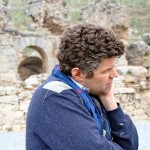 What if the most remarkable country in the world that has been negatively and unfairly defined by a single movie? What if the most remarkable country in the world that has been negatively and unfairly defined by a single movie?
If you answered “Turkey” and “Midnight Express,” I’d say you and I agree.
In Ephesus today.
Here I momentarily forget what I’m thinking about and inadvertently find myself captivated by the tour guide’s explanation of the city’s history.
It happened many times today.
====
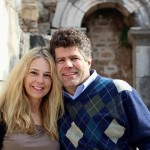 Kickin’ it with my girl, Ottoman style! ; )
One of the greatest sins we can commit is to have a chance to get to know extraordinary people.
And then not take advantage of it.
And you never know when the opportunity will present itself. So always be ready to talk. Even when your not sure.
This pic of a cat siting on a column led to some chuckles from my wife and daughter but then a nice lady with a very professional looking camera decided to take the same shot. I nudged my wife and daughter and said, “Told ya it was a good photo to take.”
The woman with the professional camera overheard us and, along with her husband, laughed. And that’s all I needed. Over the next 20 minutes I learned that Matt worked as a VC for 6 years before he and his wife, Erica, dropped out and became professional world travelers 2 years earlier. They’ve visited and written about 30 countries, mostly about economic development but also offering a sort of personal Trip Adviser take on each destination. (Think of Albert Brooks’ Lost in America —but working out. And going international.)
Next year Matt hopes to find himself in Standord’s MBA program. And deserves to be there.
And if that still isn’t enough to pique your curiosity, their website is titled “What if” with the tag line, “Living to never wonder, What if”
Extraordinary young people I have a feeling I’ll see again and already have suggested they write for a blog and would love to help these two any way I can.
And I never even took the time to go back and thank the cat for awkwardly sitting on that column and giving me an excuse to meet to fine young Americans–Living the American Dream. (without a sarcastic overtone)
====
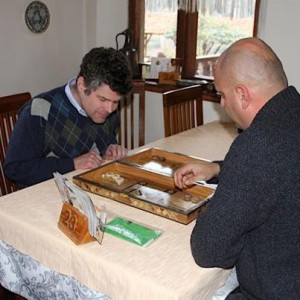 Oh no you didn’t! Oh no you didn’t!
You didn’t really dismiss the idea of an American ever beating you in backgammon, before I did!
“Here, we play very fast.”
“In Kentucky, we just beat you. Whether you get beat playing in fast motion or slow motion is completely up to you.”
I wanted to say but didn’t. Instead, I said, “Oh, OK. Sure. Maybe we can play sometime.” ; )
Me with our world class tour guy and all round great guy….getting a free backgammon lesson from his KY friend.
“Many people think backgammon came from Persia. Actually, it came from Appalachia.” Something else I wanted to say but didn’t have the courage. ; )
====
Theology and social media? No!!
My deep insight of the day offered to our tour group.
In Ephesus our tour guide was explaining the “Letters” written from the area by Saul of Taursus and John and St John –and how these letters later became entire books of the Bible.
“Sir,” I offered, “Can you imagine what the Bible would look like if they’d had email back then and communicated informally via email, texts and Twitter? It would be a third of the length and filled with ridiculous acronyms and smiley faces and even a few LOLs!”
I’m pretty sure no one had ever made that point to him before and was pretty proud of my theological insight. ; )
LOL!
Read the rest of…
John Y. Brown, III: An American in Turkey
By John Y. Brown III, on Tue Dec 18, 2012 at 9:15 AM ET I’m not complaining. Being on a cruise ship is great.
Really.
OK. Not entirely.
It can be a little confining. But it’s mostly very pleasant.
However, it can play games with your mind.
For example, it just occurred to me that the real reason in Dr Suess’s Green Eggs and Ham that Sam-I-Am gave in and agreed to try –and then admitted he liked —green eggs and ham in a boat WAS NOT because he finally became open minded about the and discovered he liked the taste.
But rather he was feeling claustrophobic after being on that boat several days and was willing to say or do anything to wrap the story up so he could get back to dry land.
And now I really am going to bed. Before someone offers me green food and a fork. ; )
====
Cruise ships and Reincarnation.
I don’t really believe in reincarnation….but I’m no expert on the topic either. I just know what it means as a general matter and couldn’t help thinking of it yesterday when boarding our cruise ship.
There were several hundred of us. Maybe closer to 1000. Tall, short, skinny, heavy, loud, quiet, young and old— different ethnicities and skin colors, and temperaments and personalities from across those spectrums.
These were the assemblage of people fate had handed me to experience this voyage with. They would be the people populating my new world.
I didn’t know any of them but had to be careful not to pre-judge who I would get along with and who I wouldn’t. I’m always surprised in that way.But there we were. Like the first episode of Lost –only a lot more of them and none of us were cast for a TV show. And, fortunately, we weren’t really lost.
But we we will be discovering and experiencing things together and create a miniature microcosm of a world of our own for a week. And least that’s what i imagined.If we had longer–a few months or year or two together, maybe we’d develop a tribe or community or perhaps even a city and decide what our common characteristics are — they’d be arbitrary, of course (a desire for adventure and interest traveling my water and ability to live in close quarters with others, etc)—and try to define ourselves accordingly.
 Picture #2: What a Mediterranean Cruise actually looks like. And then, I suppose, after distinguishing ourselves from other “cruise ship cities or communities” we’d elect leaders to protect us from them.
That just seems so odd and funny. And yet it isn’t so far fetched compared to the way we humans do form tribes, communities, cities, states and countries.
Then again, I had a lot of time to think about it all because registration for the cruise was slow…and when I have free time on my hands, my mind wanders and my imagination takes on a life of its own. Especially if I’ve just taken a Dramamine tablet.
Actually, my first thought was “This feels like the first day at a new school.” That worked for awhile and I was good with that analogy and just trying to figure out where I’d fit in and wasn’t having much luck. But as registration dragged on….my thoughts moved from first days at a new school to how communities develop to what caused nations to go to war to what reincarnation must feel like to experience. And then we were all checked in, so I stopped there.
Probably a good place to stop. Besides, the Dramamine was wearing off anyway and it started to feel like I had simply boarded a cruise ship with my family and checked into my cabin. Geez. That sounds so overly-simplified and pedestrian. But could be that’s all there was to it.
By John Y. Brown III, on Mon Dec 17, 2012 at 10:00 AM ET God showing off this morning in Pireus, Greece.
What’s the point of being in Greece if you can’t come up with a little philosophy along the way?
Like eating in Italy; philosophizing in Greece is unavoidable. So here goes.
A cautionary tale:
Why is it the lessons we are taught in life—the bigger lessons; the morality tales, the ultimate life questions—are so difficult to master?
We are taught these simple lessons over and over and still over again throughout life.
First through school primers, then fairy tales, then film, music and art, then through literature, then philosophy, then theology ,and then through the life of those around us and near to us, and finally and most painfully, through our own lives.
And then the final stage of this educational process arrives and we become the teachers ourselves to those younger and less wise, when we die, having never learned these life lessons fully enough along the way.
We are born to learn and yet the less we learn the more we teach when we die.
A cautionary tale.
====
“Be not afraid of being a tourist: some are born tourists, some achieve tourist status and some have have being a tourist thrust upon them–usually by their spouse.”–
Paraphrase of Shakespeare
====
Are you smarter than an 8th grade slacker?
Probably.
 Today we visited–with my wife and two teen kids–the Acropolis and the Parthenon in Greece. Today we visited–with my wife and two teen kids–the Acropolis and the Parthenon in Greece.
As we walked by where some of our civilization’s earliest and greatest minds philosophized about the nature of democracy, ethics and the the meaning of life, my mind raced to try to recall a childhood school lesson about this place’s historic significance.
I almost started my impromptu lecture before a full thought had fallen into place….but then caught myself when I realized what the full thought was. And it was this.
“Johnny and Maggie, I’m going to tell you my story about learning about the Acropolis and Parthenon. It’s funny, so you’ll like it. When I was in Mrs Hughes eighth grade world civilization class we studied these great Greece structures and their significance –and had a pop quiz one morning to name the Parthenon, Acropolis and one other structure I can’t remember.
Look, I wasn’t a really, really, really good student back then. In fact, I wasn’t even a good student. So, I hadn’t read the assignment and, although I hate to admit doing this, I was sitting next to a smart student and craned my neck straining to see the answer and copy it down myself. I rationalized it was only a pop quiz and the first two weeks of classes and I wouldn’t do it again.
What I saw written on the good student’s page looked like a foreign language. “What kinds of names are these? I wondered.
I did the best I could copying down my friend’s answers one letter at a time and hoping for the best. The next day was relieved to see I had gotten a passing grade on the quiz —but noted a written comment, “John, your spelling is terrible!!”
====
“If I’d only known then what I know now about what’s important in life, I would have done things very different.”
No, you wouldn’t have. Or at least, No, I wouldn’t have. And I just realized this harsh truth fully today for the first time
 When I was 20 years old I had the opportunity of a lifetime to spend a semester abroad traveling to less developed countries and seeing these countries, their people and their cultures first hand. But it was also a low point in my life where shallowness (masquerading as existential angst) and excessive alcohol combined to cause me to miss out on taking full advantage of my brief time in these foreign countries. So I told myself for several decades. When I was 20 years old I had the opportunity of a lifetime to spend a semester abroad traveling to less developed countries and seeing these countries, their people and their cultures first hand. But it was also a low point in my life where shallowness (masquerading as existential angst) and excessive alcohol combined to cause me to miss out on taking full advantage of my brief time in these foreign countries. So I told myself for several decades.
Back then I had a Walkman I carried with me everywhere and always had my headphones on. My roommate once yelled (laughing and frustrated), “If I hear the song Rainmaker or Low Spark of High Heeled Boys again by Traffic one more time —I’m going to scream and then unravel your cassette tape!”
And so today, back in a poor foreign country for the first time in nearly 30 years, my tourism habits should have been much more structured and refined. But there I was, walking through the Acropolis in Greece and taking pictures of the Parthenon, with my ear buds in from my iPod and listening to, unbelievably, Steve Winwood singing Can’t Find My Way Home –and singing under my breath just low enough so no one will hear me. And even dancing ever-so-slightly too.
And I “got it.” No. I would never have been any different “Had I known then what I know now.” Or at least not that different. At best, I would have handled life about the same way as I did the first time around. Just maybe picked a slightly better song from a slightly different band but with the same lead singer to listen to while being irresponsible.
And not riding elephants and wearing tie-dye shirts.
(Please note today I wasn’t wearing Tie-Dye but rather a cream colored pull-over sweater from Jos. A. Banks. And long pants.)
====
“With all its sham, drudgery, and broken dreams,it is still a beautiful world.”
Desiserata -Max Ehrmann
====
Vacation mindsets.
When I am on a vacation, I think of how to do as little as possible, if I think at all.
My wife, on the other hand, the consummate planner, prefers to treat vacations as an opportunity to earn extra college credit.I think she may secretly be working on her masters this trip.
I, on the other hand, am opting for the GED approach.
Which one is smarter?
I’m afraid I’m not smart enough to know the answer to that.
Oh, and who planned out this entire vacation?
That would be my wife.
Thank you, honey.
I’ll be there in a minute. Studying for my GED right now. ; )
====
When trying to keep your wits about you in a remote part of the world, I’m happy to report Eric Clapton works as well as ever. Maybe better.
By John Y. Brown III, on Fri Dec 14, 2012 at 9:15 AM ET  American tourists abroad. American tourists abroad.
These are some suave folks here in Europe. At least here in Italy. They just seem to be that way naturally. I do get the occasional look—part envious and part exasperated — as though to say, “You must be American.Hmmm. That would explain it.”
I think we are viewed as big, arrogant, slightly clueless rubes who have more money, confidence and power than we deserve or know what to do with. Sort of the same way we in the US view people from Texas.
====
 Things I am learning in Italy and want to pass along to friends who may not know. Things I am learning in Italy and want to pass along to friends who may not know.
“The look.”
When someone addresses confidently in a foreign country in their own language, it can be an intimidating situation. They may be paying us a compliment, asking us a general question, trying to find common ground, or casting some sort of insult or warning us we are breaking the law or custom.
When this happens, the best advice is to just smile and give the person the old tried-and-true American survivalist abroad safety “look” that we offer up when someone in a foreign country says something to us and we don’t have a clue what they are saying. You know the one….It’s that look that says:
“I’m really pleased with the attention you are giving me but am confused— as usual. And I don’t speak your language. I am an American and just haven’t had time to learn it. But if I did speak your language I would try to say something now that was appropriate and would please you more or—in the event what you are saying to me has a strong negative connotation—say something to help me to not get arrested in this scary and backward (at least by American standards) foreign country. I do not want to re-live Midnight Express even if I’m not in Turkey right now. Midnight Express could have happened here, too, you know. I just want you to stop saying words to me like I know them when I don’t. It scares me and I don’t trust you that much to begin with and this is only making it worse for me and could even affect how much money I spend on your country’s economy this trip. Don’t get me wrong, I am a nice person and didn’t say bad things about your country after they didn’t join the Coalition of the Willing after 9-11. I really didn’t. ”
Seriously. In fact, I’m a Democrat. I don’t even own a gun. Please just feel both “afraid of me” and “sorry for me” at the same time – OK? Please just think of me as both a “deer-in-the headlights” but also the one deer who could be “king of the jungle.” I know that deer aren’t really kings of the jungle. That’s another animal. Like a Lions or bear. But that doesn’t matter. I’m an American and don’t have to know details like that. Just have to have a certain look at the right times.”Yes, that look! If you’ve ever traveled abroad you know it well…and probably used it daily. Even if you are a republican. (Although some from the GOP do drop 2 of the final 3 sentences and get almost the same response of exasperated pity.
And this well –honed instinctive look is what helps us have both pleasant exchanges abroad and not to relive Midnight Express. The two primary goals of most every American traveling abroad.
====
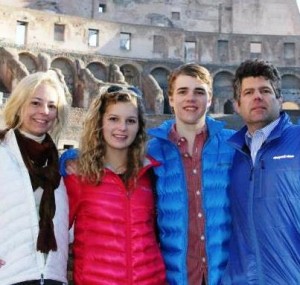 If you are in Rome and want to see the Coliseum, be sure you spell it the way they do in Rome. They use this alternative spelling, “Colosseum” Probably on purpose to keep so many people from stampeding the historic amphitheater and taking endless pictures of it. Like this family did. If you are in Rome and want to see the Coliseum, be sure you spell it the way they do in Rome. They use this alternative spelling, “Colosseum” Probably on purpose to keep so many people from stampeding the historic amphitheater and taking endless pictures of it. Like this family did.
====
Was a little disappointed to find that pizzas here in Italy are not served with a free banana pepper.
====
Things I am learning in Italy and want to pass along to friends who may not know.
“Prego,” as it turns out, does not mean pregnant.
I’m not sure what it means. I know there used to be a Prego spaghetti sauce but it doesn’t mean “spaghetti sauce” either.
I’m not quiet sure what it means….but know for sure that if someone in Italy says to you
“Prego!” you should not be offended that they are either calling you (or your wife) pregnant or asking you for spaghetti sauce. They are doing neither.
====
Read the rest of…
John Y. Brown, III: An American in Italy
|
The Recovering Politician Bookstore
|










 Well, the trip is about over now. The trip of a lifetime, for sure, for my family.
Well, the trip is about over now. The trip of a lifetime, for sure, for my family. What if the most remarkable country in the world that has been negatively and unfairly defined by a single movie?
What if the most remarkable country in the world that has been negatively and unfairly defined by a single movie?
 Oh no you didn’t!
Oh no you didn’t!
 Today we visited–with my wife and two teen kids–the Acropolis and the Parthenon in Greece.
Today we visited–with my wife and two teen kids–the Acropolis and the Parthenon in Greece. When I was 20 years old I had the opportunity of a lifetime to spend a semester abroad traveling to less developed countries and seeing these countries, their people and their cultures first hand. But it was also a low point in my life where shallowness (masquerading as existential angst) and excessive alcohol combined to cause me to miss out on taking full advantage of my brief time in these foreign countries. So I told myself for several decades.
When I was 20 years old I had the opportunity of a lifetime to spend a semester abroad traveling to less developed countries and seeing these countries, their people and their cultures first hand. But it was also a low point in my life where shallowness (masquerading as existential angst) and excessive alcohol combined to cause me to miss out on taking full advantage of my brief time in these foreign countries. So I told myself for several decades.

 If you are in Rome and want to see the Coliseum, be sure you spell it the way they do in Rome. They use this alternative spelling, “Colosseum” Probably on purpose to keep so many people from stampeding the historic amphitheater and taking endless pictures of it. Like this family did.
If you are in Rome and want to see the Coliseum, be sure you spell it the way they do in Rome. They use this alternative spelling, “Colosseum” Probably on purpose to keep so many people from stampeding the historic amphitheater and taking endless pictures of it. Like this family did.


